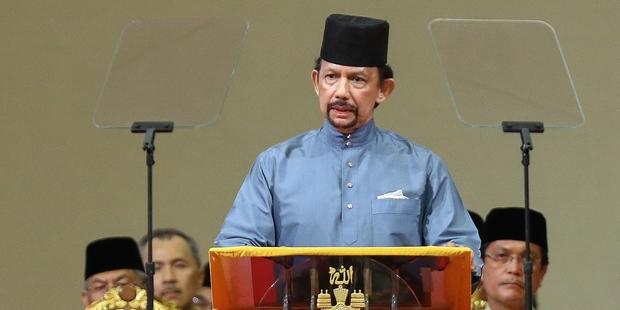- 12 May 2014
- [International Secretariat]
- Region:
- Topic: International human rights law

runei Darussalam's new Penal Code, announced by Sultan Hassanal Bolkiah, will come into force Thursday.(C)STR/AFP/Getty Images
Brunei Darussalam’s shocking new Penal Code will take the country back to the dark ages when it comes to human rights, Amnesty International said.
The new Penal Code, which is due to come into force on 1 May, allows for cruel and inhuman punishments including stoning to death, whipping and amputation.
“Brunei Darussalam’s new Penal Code legalizes cruel and inhuman punishments. It makes a mockery of the country’s international human rights commitments and must be revoked immediately,” said Rupert Abbott, Deputy Asia-Pacific Director at Amnesty International.
The law imposes the death penalty for a range of offences which do not meet the threshold of the “most serious crimes” under international law, including robbery. Defendants who were under 18 years of age when crimes were committed can also be sentenced to death.
“The new code even permits stoning to death for acts which should not be considered ‘crimes’ in the first place, such as extramarital sexual relations and consensual sex between adults of the same gender,” said Rupert Abbott.
The new Penal Code also contains a range of provisions which will restrict the right to freedom of thought, conscience and religion, and which discriminate against women.
The law has received strong criticism from members of the international community, including international human rights organizations and the United Nations. Some LGBTI (lesbian, gay, bisexual, transgender and intersex) groups and others have reacted by boycotting businesses owned by the head of state, the Sultan of Brunei.
Brunei Darussalam’s human rights record will be reviewed by the United Nations Human Rights Council in Geneva on 2 May, a day after the Penal Code takes effect. “UN member states must take this opportunity to push Brunei Darussalam to revoke this shocking Penal Code and ensure that the country’s laws are in strict compliance with international human rights law and standards,” said Rupert Abbott.
30 April 2014
AMNESTY INTERNATIONAL PRESS RELEASE




